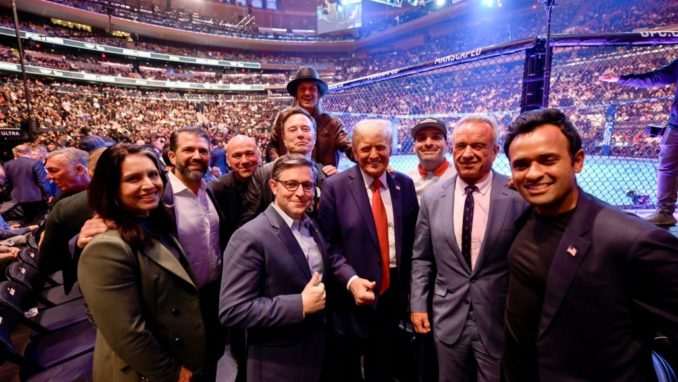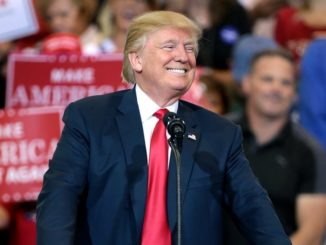
Office of Speaker Mike Johnson, Public domain, via Wikimedia Commons
In a previous post titled “Why Does Government Always Make the Same Economic Mistakes?” I quoted Judicial Watch CEO Tom Fitton. Regarding another matter he said that the way to predict future behavior is to look at what was done previously under similar circumstances. We know that the Donald wants to enforce our immigration laws, which means strict border control especially via our southern border, plus higher and more widespread tariffs. We also know that he wants a quick end to the Ukraine war. We know that Elon and Vivek, running the new Department of Government Efficiency (DOGE), want to find, and presumably cut, waste and inefficiency. What is the likelihood that these goals will be achieved and, more importantly, are they worthy goals in the first place?
First let’s look at Elon and Vivek’s new DOGE. Spoiler alert: this is government and not a private company. If this were a private company, the entity titled “US Government” would have gone out of business long, long ago. I have no doubt that Elon and Vivek will find waste and inefficiency on a massive scale. A blind man could do that. But without the cooperation of Congress, they will fail in doing anything significant about it. First of all, Congress controls the purse strings. The chances of cutting spending in any significant amount are almost nil, because their (and almost everyone else’s) definition of waste is viewed as essential spending by some congressmen. It will require great political skill to arrive at spending cuts across the board. The three big buckets of spending are Social Security, Medicare, and the military. Except for possible minor cuts, there is no way that Congress will cut spending in any significant way for these three programs. In addition, there’s longstanding legislation that insulates government bureaucrats from political oversight. It has become a protected class that knows that it really runs the government. Congress would have to vote for a complete overhaul of very longstanding legislation that has made government workers almost a fourth branch of government. This is highly unlikely. Sorry to be so negative, but that’s the way I see it.
However, I predict that the Donald will be successful in ending the Ukraine war and slowing down illegal immigration. The nation is with him, and Congress will not dare to challenge him in his efforts. Our European allies are both tired of the war and literally out of ammunition to support Ukraine. Many are appalled that Ukraine is using Western weapons to attack deep into Russia, threatening World War III. On the immigration front some nations, such as Hungary, have shown that it is possible to control the borders. Although the Donald may find it more difficult to deport illegal aliens already here, the nation is with him and Congress will not dare stand in his way.
I also believe that as president, the Donald will succeed in implementing more widespread and higher tariffs, although I wish it were not so. The president-elect has admired using trade as a weapon for a long, long time, even before he considered running for political office. (Remember Tom Fitton’s rule.) Unfortunately for this free market/free trade economist, the country seems to side with him. So, just as the US and the world slide into recession, the US will repeat the disastrous Smoot-Hawley tariffs of 1930 that triggered worldwide reciprocal tariffs. Depression, tyranny, and war followed. So, the Donald may get his tariffs only to go down in history as the twenty-first century’s Herbert Hoover.
Notice that it is the electorate that will get its way, perhaps not fully but at least partially. Although the electorate will say that it wants to eliminate waste and inefficiency in government, these are general goals only. Some voters who now get benefits would lose them, which will raise an almighty howl. The same pertains to businesses and workers who benefit from government spending. We’ve seen this time and again over the years. However, Illegal aliens don’t vote (at least not legally) and stopping illegal immigration is simply enforcing federal law. Who would argue against that? Stopping illegal entry may be more successful than deporting those already here, but the electorate supports the effort. Likewise, the electorate supports higher tariffs. Despite both theoretical and empirical evidence that enacting tariffs is like shooting oneself in the foot, I think the Donald and the electorate will get them.
“When the gods wish to punish us, they answer our prayers.” Oscar Wilde.”
© Patrick Barron 2024 Website



